
The Parliament of Northern Ireland was the home rule legislature of Northern Ireland, created under the Government of Ireland Act 1920, which sat from 7 June 1921 to 30 March 1972, when it was suspended because of its inability to restore order during The Troubles, resulting in the introduction of Direct Rule. It was abolished under the Northern Ireland Constitution Act 1973.
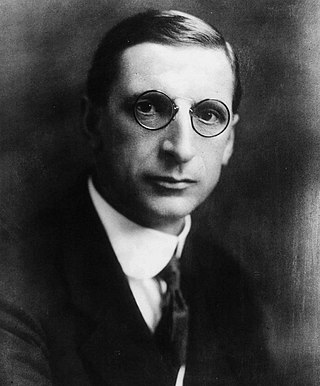
The Irish component of the 1918 United Kingdom general election took place on 14 December 1918. It was the final United Kingdom general election to be held throughout Ireland, as the next election would happen following Irish independence. It is a key moment in modern Irish history, seeing the overwhelming defeat of the moderate nationalist Irish Parliamentary Party (IPP), which had dominated the Irish political landscape since the 1880s, and a landslide victory for the radical Sinn Féin party. Sinn Féin had never previously stood in a general election, but had won six seats in by-elections in 1917–1918. The party had vowed in its manifesto to establish an independent Irish Republic. In Ulster, however, the Unionist Party was the most successful party.
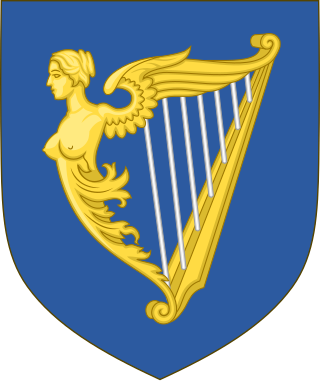
The Irish Parliamentary Party was formed in 1874 by Isaac Butt, the leader of the Nationalist Party, replacing the Home Rule League, as official parliamentary party for Irish nationalist Members of Parliament (MPs) elected to the House of Commons at Westminster within the United Kingdom of Great Britain and Ireland up until 1918. Its central objectives were legislative independence for Ireland and land reform. Its constitutional movement was instrumental in laying the groundwork for Irish self-government through three Irish Home Rule bills.

The 1918 United Kingdom general election was called immediately after the Armistice with Germany which ended the First World War, and was held on Saturday, 14 December 1918. The governing coalition, under Prime Minister David Lloyd George, sent letters of endorsement to candidates who supported the coalition government. These were nicknamed "Coalition Coupons", and led to the election being known as the "coupon election". The result was a massive landslide in favour of the coalition, comprising primarily the Conservatives and Coalition Liberals, with massive losses for Liberals who were not endorsed. Nearly all the Liberal MPs without coupons were defeated, including party leader H. H. Asquith.

The Local Government (Ireland) Act 1898 was an Act of the Parliament of the United Kingdom of Great Britain and Ireland that established a system of local government in Ireland similar to that already created for England, Wales and Scotland by legislation in 1888 and 1889. The Act effectively ended landlord control of local government in Ireland.

Fermanagh District Council was a local council in Northern Ireland. It was created out of Fermanagh County Council and later merged with Omagh District Council in April 2015 under local government reorganisation to become Fermanagh and Omagh District Council.

North Down is a parliamentary constituency in the United Kingdom House of Commons. The current MP is Alex Easton, elected at the 2024 United Kingdom general election.
Armagh or County Armagh is a former county constituency in the House of Commons of the United Kingdom. It was a two-member constituency in Ireland from 1801 to 1885 and a single-member constituency in Northern Ireland from 1922 to 1950. It was replaced in boundary changes in 1983.
Alexander Blane was an Irish nationalist politician and Member of Parliament (MP) for South Armagh, 1885–92. He was a supporter of Charles Stewart Parnell during the Split in the Irish Parliamentary Party, and later a pioneering Socialist. In 1876 he was appointed agent to the Catholic Registration Association, an organization dedicated to maximising the Catholic vote. He was also president of the Prisoners’ Aid Society.

Elections for local government were held in Northern Ireland on 15 May 1985, contesting 565 seats in all.
Robert Dorman was an Irish socialist activist.

Elections were held in January and June 1920 for the various county and district councils of Ireland. The elections were organised by the Dublin Castle administration under the law of the then United Kingdom of Great Britain and Ireland (UK), and held while the Irish War of Independence was pitting UK forces against those of the Irish Republic proclaimed in 1919 by the First Dáil. Elections were held in two stages: borough and urban district councils in January; and county and rural district councils in June. Sinn Féin, which had established the First Dáil, won control of many of the councils, which subsequently broke contact with Dublin Castle's Local Government Board for Ireland and instead recognised the republican Department of Local Government. The election results provide historians with a barometer of public opinion in what would be the last elections administered on an all-island basis: the Government of Ireland Act 1920 passed at the end of the year effected the partition of Ireland from 1921, though the elections for the two home rule Parliaments envisaged by it were held on the same day; No further elections would be held simultaneously across the island of Ireland until 1979, when representatives of the Republic of Ireland and Northern Ireland to the European Parliament were elected. The next local elections were held in 1924 in Northern Ireland and in 1925 in the Irish Free State.

An election to Belfast Corporation took place in January 1920 as part of that year's Irish local elections. The Local Government (Ireland) Act 1919 had seen elections for local government in Ireland change to a more proportional system. As a result, Unionist dominance of the Belfast council was somewhat undermined, and the party lost 15 seats. In contrast Labour, Sinn Féin, and Nationalist representation grew, resulting in a more politically and socially representative council.

The 1899 Irish local elections were the first local elections following the reorganisation of Irish local government caused by the Local Government (Ireland) Act 1898. The 1898 Act had changed the nature of Irish local governance, replacing the unrepresentative grand jury system, and making local government more democratic and representative. As a result, the 1899 election saw the traditional Unionist Landowning class, which had previously dominated much of Irish local politics, being replaced by a newer nationalist representation. Ulster's local government, however, remained Unionist in political outlook.
An election to Dublin Corporation took place on Thursday 15 January 1914 as part of that year's Irish local elections.
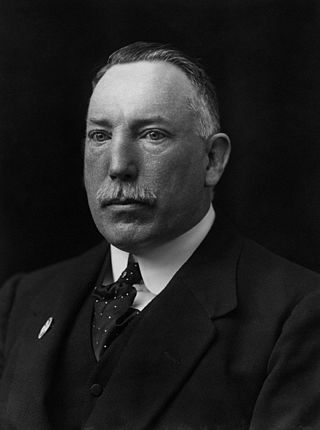
The 1924 Northern Irish local elections were held in January & June 1924 for the various county & district councils of Northern Ireland. The election followed changes by the Unionist government, which had redrawn electoral districts, abolished PR for local elections, and implemented a requirement for members of local authorities to take an oath of allegiance.
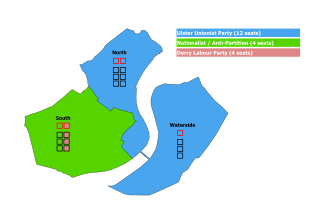
Elections to Londonderry Borough Council were held on 16 October 1946. The Ulster Unionist Party (UUP) retained their majority with Sir Basil McFarland continuing as Mayor of Londonderry. The elections were postponed from the original February date due to an unusually large number of objections to the list of electors.
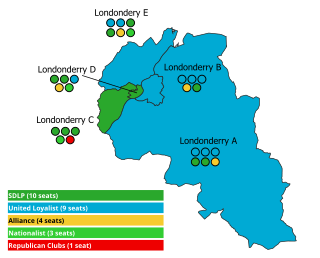
The 1973 Londonderry City Council election took place on 30 May 1973 to elect members of Londonderry City Council in Northern Ireland. This was on the same day as other Northern Irish local elections. The campaign was significant in that, following changes to the election process and districts, Irish nationalist parties were able to take control of the council for the first time.

Elections to Londonderry Borough Council were held on 17 May 1967, amidst the Northern Ireland civil rights movement.

The 1901 Dublin Corporation election took place in January 1901 in five wards added to Dublin city under the Dublin Corporation Act 1900. The twenty councillors elected to these seats sat in addition to the sixty who had been elected in 1899, bringing the council size to 80.















